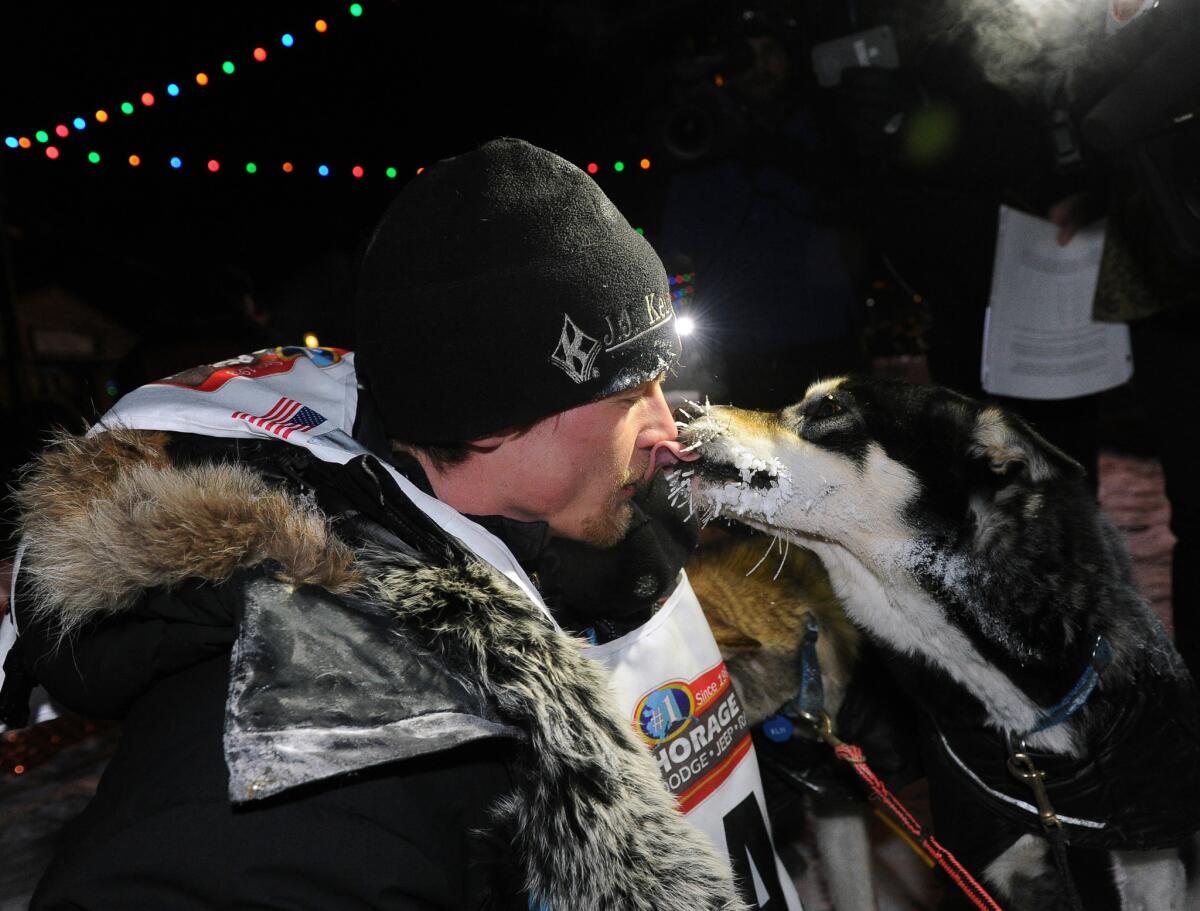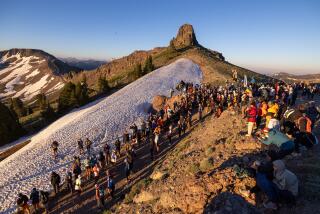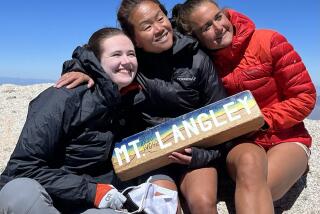It’s Dallas Seavey in surprise record finish for Alaska’s Iditarod

- Share via
Beatle, a real lead dog, powered his team to a record-breaking, come-from-behind victory in the Iditarod Trail Sled Dog Race. The Big Dog helped bring the human half of the partnership across Alaska to the finish line in Nome, where an exhausted Dallas Seavey was able to claim his second crown.
With just seven dogs remaining from his starting team of 16, Seavey crossed the finish line early Tuesday after a storm knocked front-runner Jeff King out of the race and prompted Aliy Zirkle, also ahead at one point, to hole up in Safety, Alaska, for more than two hours. Zirkle finished second, about two minutes behind.
The finish was so storybook that Seavey didn’t even realize he had won until about 90 seconds after he had crossed the finish line.
Seavey, 26, jogged beside his sled down Nome’s Front Street to help ease the load pulled by his dogs. At one point, he glanced over his shoulder, thinking his dad, defending champion Mitch Seavey, was gaining on him.
“Man, this is a lot of people coming out to see third place come in,” Seavey told reporters at a packed post-race news conference in Nome.
As the younger Seavey crossed the finish line, photographers caught the image of great fatigue as he leaned his head on his handlebar.
“How did you do it?” an Iditarod Insider videographer asked the musher.
“What’d I do?”
“You just won the Iditarod.”
“I think you guys knew before I did,” he told reporters later.
Mitch Seavey, another two-time winner, finished third. A Seavey has been the winner in each of the past three years, and four times since 2004, making them in the universe of mushing, the equivalent of the basketball Chicago Bulls.
The finish, the second-closest in Iditarod’s more than 40-year history, was created in the homestretch, the last about 22 miles from Safety to Nome. The race is 975 miles long from Willow to Nome, and Seavey finished the race more than five hours better than John Baker’s 2011 record of eight days, 18 hours, 46 minutes, 39 seconds.
On Monday afternoon, King had an hour’s lead over Zirkle, and Seavey was several hours behind the leaders. It looked like a two-person race.
At Safety, the last checkpoint, the runners came off of the sled.
High winds and a ground blizzard marred the course after there had been complaints that climate change had deprived the race of miles of snowy track.
A gust of wind blew King off course and into driftwood about four miles before Safety. He was able to get the dog team back together, but they wouldn’t run, so he sat for 2 1/2 hours until he flagged down a passing snowmobiler. He hitched a ride to the checkpoint at Safety and scratched.
Zirkle had made up the hour on King, but conditions were so bad, she decided to stay in Safety. “I had to stop in Safety for a couple of dogs and myself,” Zirkle, who had frostbite on her hands, said afterward. “I said, to heck with it, I’m staying,” Zirkle said.
She had a cup of coffee, talked to people and took a nap.
After she woke up, she saw Seavey breeze through the checkpoint, staying only three minutes. She walked outside and decided to get on the trail, after resting there two hours and 38 minutes.
Zirkle then left the checkpoint 19 minutes after Seavey.
She lost the race by two minutes. “Sure, yeah, hindsight, blah, blah, blah … second’s pretty good,” Zirkle said about her third consecutive second-place finish.
The race began March 2 in Willow with 69 teams. As of Tuesday morning, 17 mushers had dropped out and one was withdrawn.
The Iditarod winner receives $50,000 and a new truck. The 29 teams after that get cash prizes decreasing on a sliding scale. All other teams finishing the race receive $1,049.
As for winner Seavy, he wasn’t in a big hurry. As he put it: “I was racing for third, and I was telling my dogs, ‘We’ve done our work here. You guys have done a good job. Let’s go home. No rush, guys. Let’s take it easy.’ ”
He even stopped to take selfies during sunset right before he hit the bad weather.
Follow LATimes National on FacebookALSO:
General’s sex charge trial halts as plea negotiations ensue
Colorado marijuana sales rake in $2 million in taxes in January
Terror case prosecutors show video of accused praising 9/11 attacks
More to Read
Sign up for Essential California
The most important California stories and recommendations in your inbox every morning.
You may occasionally receive promotional content from the Los Angeles Times.














